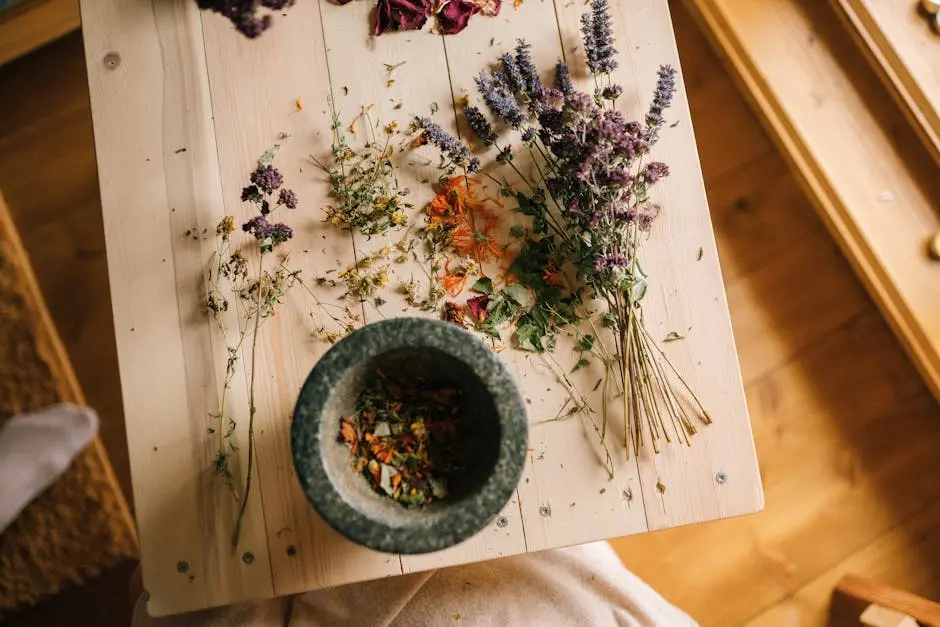Ritual herbs have been used for centuries in various cultures to promote healing and wellness. But can these herbs truly aid in physical and emotional healing? Let’s explore the potential healing properties of ritual herbs.
Understanding Ritual Herbs
Ritual herbs are plants used in spiritual rituals, often believed to possess unique energies. Understanding their origins and uses is crucial to exploring their healing potentials.
Traditions varying from Native American practices to ancient European folk remedies have embraced these herbs for their potent effects. It’s not just about the herbs themselves; it’s also about the intention behind their use. This connection to intention is what many believe enhances their healing capabilities.
Exploring the cultural significance of ritual herbs unveils a rich tapestry of beliefs surrounding health and wellness. In many societies, these herbs are seen as sacred, a bridge between the physical and the spiritual realms.
Common Ritual Herbs and Their Benefits
Many ritual herbs like sage, rosemary, and lavender are known for their calming and healing properties. Each herb comes with its own set of benefits.
For example, sage is often used for cleansing spaces and has anti-inflammatory properties that can support physical healing. Lavender, renowned for its soothing fragrance, can help reduce anxiety and improve sleep quality.
Additionally, herbs like chamomile and peppermint are valued not just for their flavors but for their ability to aid digestion and promote relaxation. Each herb you choose to incorporate into your wellness routine can serve a distinct purpose.
It’s exciting to discover the unique benefits of less common ritual herbs, such as mugwort, which can enhance dreams and intuition. Understanding the specific properties of each herb opens up new possibilities for healing.
How to Use Ritual Herbs for Healing
There are various ways to incorporate ritual herbs into your healing practices, such as through teas, smudging, or essential oils. Learn the methods that resonate with you.
For a peaceful evening, brewing a cup of chamomile tea or adding lavender to your bath can create a calming environment. Alternatively, smudging with sage can clear negative energies from your home, setting the stage for tranquility.
Essential oils derived from these herbs can also be beneficial. A few drops of rosemary oil in a diffuser can stimulate focus and creativity, perfect for those long workdays.
Experimenting with different combinations of these rituals might lead you to your own unique practices. Consider journaling your experiences to track which methods feel the most healing and fulfilling.
Precautions When Using Ritual Herbs
While many ritual herbs are safe, some can cause allergic reactions or interact with medications. It’s essential to be informed before using them.
Always check for allergies, particularly with potent herbs like eucalyptus or peppermint, which may not be suitable for everyone. A patch test for oils or a small taste of a new herbal tea can help gauge your body’s response.
Moreover, pregnant or nursing individuals, along with those on specific medications, should consult with a healthcare provider before integrating any new herb into their routines. Safeguarding your health is paramount.
Collecting knowledge from reputable sources and practicing cautious experimentation are key. This balanced approach can help you make the most of the potential benefits while minimizing risks.
Integrating Ritual Herbs with Modern Medicine
Many people find that ritual herbs can complement modern medical practices. Open communication with healthcare providers can help in combining these approaches safely.
It’s important to discuss any ritual herbs or remedies you’re considering adding to your routine with your doctor, especially if you’re managing chronic conditions. They may have insights into safe combinations or specific herbs to avoid.
Practitioners of integrative medicine often advocate for a holistic approach that includes the benefits of both traditional medicine and natural remedies. This synergy can foster a more comprehensive treatment plan tailored to individual needs.
Engaging with local herbalists or joining community workshops can also broaden your understanding of how ritual herbs work, providing additional avenues of support beyond conventional medicine.
By respecting both ritual herbs and modern medicine, we open a dialogue that empowers us to take charge of our health more fully. Embracing this comprehensive view leads us towards a balanced and holistic lifestyle.
Final Thoughts on Healing with Ritual Herbs
Ritual herbs offer a fascinating approach to well-being and healing. While they can complement traditional medicine, it’s essential to consult with healthcare professionals when addressing serious health issues.






